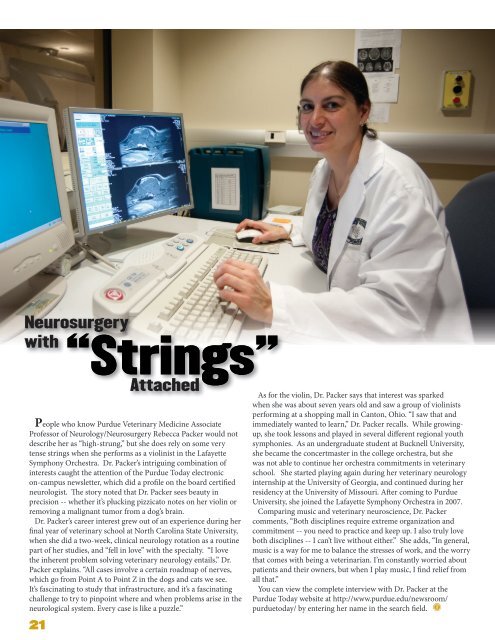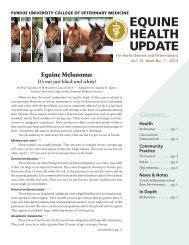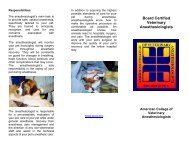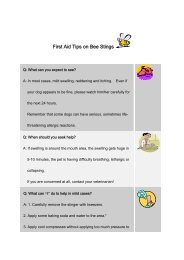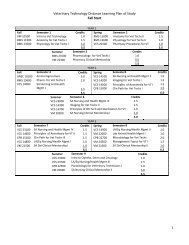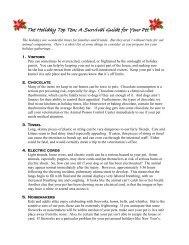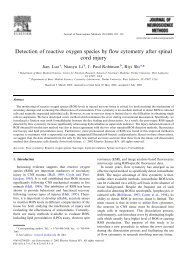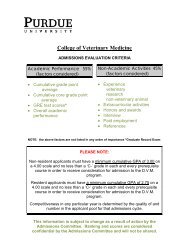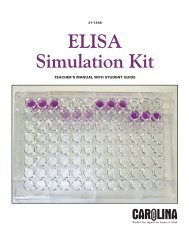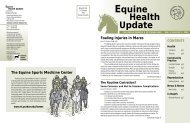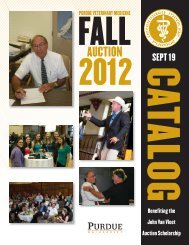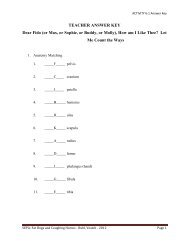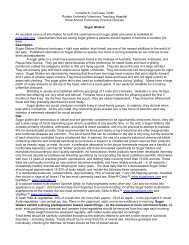2013 PVM Report - Purdue University School of Veterinary Medicine
2013 PVM Report - Purdue University School of Veterinary Medicine
2013 PVM Report - Purdue University School of Veterinary Medicine
You also want an ePaper? Increase the reach of your titles
YUMPU automatically turns print PDFs into web optimized ePapers that Google loves.
Neurosurgery<br />
with<br />
“Strings”<br />
Attached<br />
People who know <strong>Purdue</strong> <strong>Veterinary</strong> <strong>Medicine</strong> Associate<br />
Pr<strong>of</strong>essor <strong>of</strong> Neurology/Neurosurgery Rebecca Packer would not<br />
describe her as “high-strung,” but she does rely on some very<br />
tense strings when she performs as a violinist in the Lafayette<br />
Symphony Orchestra. Dr. Packer’s intriguing combination <strong>of</strong><br />
interests caught the attention <strong>of</strong> the <strong>Purdue</strong> Today electronic<br />
on-campus newsletter, which did a pr<strong>of</strong>ile on the board certified<br />
neurologist. The story noted that Dr. Packer sees beauty in<br />
precision -- whether it’s plucking pizzicato notes on her violin or<br />
removing a malignant tumor from a dog’s brain.<br />
Dr. Packer’s career interest grew out <strong>of</strong> an experience during her<br />
final year <strong>of</strong> veterinary school at North Carolina State <strong>University</strong>,<br />
when she did a two-week, clinical neurology rotation as a routine<br />
part <strong>of</strong> her studies, and “fell in love” with the specialty. “I love<br />
the inherent problem solving veterinary neurology entails,” Dr.<br />
Packer explains. “All cases involve a certain roadmap <strong>of</strong> nerves,<br />
which go from Point A to Point Z in the dogs and cats we see.<br />
It’s fascinating to study that infrastructure, and it’s a fascinating<br />
challenge to try to pinpoint where and when problems arise in the<br />
neurological system. Every case is like a puzzle.”<br />
21<br />
As for the violin, Dr. Packer says that interest was sparked<br />
when she was about seven years old and saw a group <strong>of</strong> violinists<br />
performing at a shopping mall in Canton, Ohio. “I saw that and<br />
immediately wanted to learn,” Dr. Packer recalls. While growingup,<br />
she took lessons and played in several different regional youth<br />
symphonies. As an undergraduate student at Bucknell <strong>University</strong>,<br />
she became the concertmaster in the college orchestra, but she<br />
was not able to continue her orchestra commitments in veterinary<br />
school. She started playing again during her veterinary neurology<br />
internship at the <strong>University</strong> <strong>of</strong> Georgia, and continued during her<br />
residency at the <strong>University</strong> <strong>of</strong> Missouri. After coming to <strong>Purdue</strong><br />
<strong>University</strong>, she joined the Lafayette Symphony Orchestra in 2007.<br />
Comparing music and veterinary neuroscience, Dr. Packer<br />
comments, “Both disciplines require extreme organization and<br />
commitment -- you need to practice and keep up. I also truly love<br />
both disciplines -- I can’t live without either.” She adds, “In general,<br />
music is a way for me to balance the stresses <strong>of</strong> work, and the worry<br />
that comes with being a veterinarian. I’m constantly worried about<br />
patients and their owners, but when I play music, I find relief from<br />
all that.”<br />
You can view the complete interview with Dr. Packer at the<br />
<strong>Purdue</strong> Today website at http://www.purdue.edu/newsroom/<br />
purduetoday/ by entering her name in the search field.


